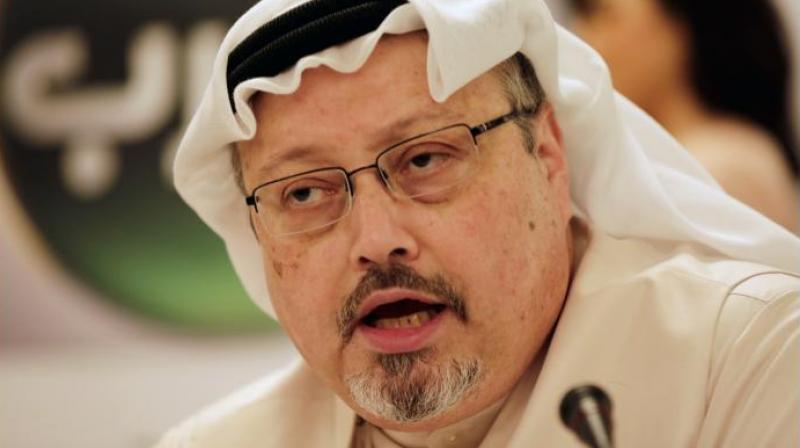Saudi, Erdogan in media war after death of Khashoggi

Had the twists and turns in the gruesome murder of Jamal Khashoggi been part of a movie script, we would have dismissed it for being too unbelievable.
But if what followed was — as President Trump rightly called it — “the worst cover-up ever” from the Saudi side, we must also acknowledge that the Turks have carried out what is possibly the greatest information management operation in recent times.
Granted, it was not a fight between equals, and the mind-boggling incompetence of the Saudis made for easy pickings. But there was a certain mastery to the way Turkish President Erdogan managed the response.
Every time the Saudis were cornered and presented yet another explanation of what had happened in that consulate-cum-abattoir, a leak from Turkish authorities soon followed that left the Saudis humiliated.
It was like watching grandmaster Gary Kasparov play chess with a kindergartener, or like watching Bruce Lee fight Shaikh Rashid — every strike was surgical, every blow splintered bone and tore muscle.
And just as the Saudis would limp away, there would come another carefully calibrated assault.
It was Chinese torture delivered through leaks and scoops, and it achieved what is next to impossible in today’s clickbaity, easy-to-move-on world: it dominated headlines for weeks and is continuing to do so where the shelf life of the average story is a few days at best. And it culminated with the world’s camera being focused on Erdogan, with ticker typists breathlessly breaking his every word.
Here’s how it worked: Turkish officials would leak news to local media outlets, and then that news would be picked up and broadcasted the world over. The irony is that Turkey, the world’s most prolific jailer of journalists, became the unquestioned source for the world’s media and the loudest voice calling for justice for Khashoggi.
The irony is that Erdogan achieved this international media coup by first effectively breaking, muzzling and intimidating all domestic media into following his line. The very media that is routinely used to target and silence dissenters in Turkey was quoted around the world.
Saudi Arabia’s own attempts at media management — while nowhere near as slick as Turkey’s and hampered by the nature of the Khashoggi case — are not to be disregarded entirely. While Turkey managed to project itself on an international level, Saudi efforts largely focused at keeping Arab media on its side by using the technique of throwing money at a problem until it goes away. Across the Arab world, Saudi Arabia has funded media outlets in a successful attempt to buy influence, the details of which can be found in diplomatic cables published by WikiLeaks in 2015. These include a $2 million bailout for a Lebanese TV network in return for a pro-Riyadh line and tens of thousands of dollars in inflated subscription fees for smaller Arab publications.
The fruits of that largesse were visible in the obedient parroting of the Saudi line, even as that line turned into a squiggle and then into something out of the fevered imaginations of Salvador Dali. From denial to dark hints about a conspiracy against Riyadh to actually praising the kingdom’s sense of justice and honour once Khashoggi’s death was admitted, most Arab media — used to obeying the commands of police states — contorted themselves like a particularly flexible jalebi.
Some, more loyal than the Crown Prince, ventured into absurdity with one Lebanese paper claiming that Khashoggi’s fiancé was actually a man in drag, and a member of the Muslim Brotherhood. No matter how laughable, every such claim was obediently amplified by hundreds of pro-Saudi social media accounts, primarily on Twitter, which posted identical content using the hashtag #WealltrustMohammadBin_Salman.
This was the product of the now widely adopted phenomenon of government-sponsored “troll farms” that aim to sway discourse in a certain direction, that aim to confuse where they cannot convince, and intimidate critics into silence by creating an illusion of pro-state consensus. It is yet another irony that Twitter, which many thought would help democratise Saudi Arabia and other countries, itself became a tool of state repression.
But even the best marketing campaign can’t sell a lousy product. Pro-Saudi channels like Al Arabiya may have consoled the loyalists and spun the already well spun, but beyond their captive audience, no one was buying it. That won’t always be the case though. The world over, states that view a free (ish) and thus noisy and inconvenient media as a threat to national interests are taking notes with great interest. Even the most authoritarian states are vying with each other to produce slick media outlets with international appeal that can seamlessly blend propaganda and news, while also providing enough regular clickbait to stay credible. The war for your mind has only just begun. Good luck sifting the news from the noise.
By arrangement with Dawn

